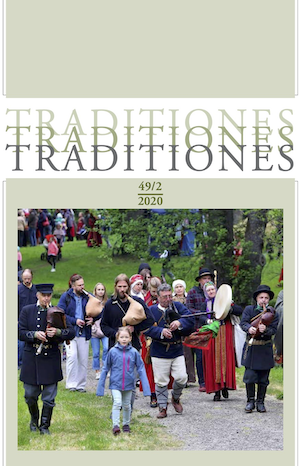Glasbene zakonitosti praznovanj okroglih obletnic starejših v Litvi
DOI:
https://doi.org/10.3986/Traditio2020490206Ključne besede:
okrogle rojstnodnevne obletnice, seniorji, petje, glasba, LitvaPovzetek
Članek na podlagi videoposnetkov, dostopnih na spletu v zadnjem desetletju, obravnava praznovanja okroglih rojstnodnevnih obletnic v Litvi. V središču raziskave so praznovanja rojstnih dni ljudi, ki so stari petdeset let in več. Glavni cilj je v pesemskem repertoarju razkriti kulturne in družbene pomene praznovanj, pri čemer avtorica uporablja strukturni in semantični pristop.
Prenosi
Literatura
Arcimavičienė, Liudmila. 2010. Cognitive Approach to Language Teaching. Cultural Reality Through Metaphor: A Case Study of Birthday Wishes. Respectus Philologicus 18 (23): 170–178.
Bell, Catherine. 1997. Ritual: Perspectives and Dimensions. New York, Oxford: Oxford University Press.
Clarke, Alison J. 2007. Consuming Children and Making Mothers: Birthday Parties, Gifts and the Pursuit of Sameness. Horizontes Antropológicos 13 (28): 263–287. http://www.scielo.br/pdf/ha/v13n28/a11v1328.pdf.
Disco-polo. [2019]. Interia Encyklopedia. https://encyklopedia.interia.pl/kultura-sztuka/muzyka-rozrywkowa/news-disco-polo,nId,2016686.
Dissanayake, Ellen. 2006. Ritual and Ritualization: Musical Means of Conveying and Shaping Emotion in Humans and Other Animals. In: Steven Brown and Ulrich Volgsten (ed.), Music and Manipulation: On the Social Uses and Social Control of Music. Oxford and New York: Berghahn Books, 31–56. https://ellendissanayake.com/publications/pdf/RitualAndRitualization_EllenDissanayake%20.pdf.
Goody, Jack. 1961. Religion and Ritual: The Definitional Problem. The British Journal of Sociology 12 (2): 142–164.
Kalacheva, Оlga. 2003. Formirovanie individualʹnoj i kollektivnoj identičnosti v kontekste neoficialʹnogo prazdnika (na primere prazdnovanija Dnja roždenija v Rossii sovetskogo i postsovetskogo periodov). Avtoreferat dissertacii na soiskanie učenoj stepeni kandidata sociologičeskih nauk. Moskva: Gosudarstvennyj Universitet – Vysšaja škola èkonomiki.
Karolczuk-Kędzierska, Monika et al. (eds.). 2009. Disco-polo. In: Encyklopedia Powszechna 3. Kraków: Kluszczyński, 290.
Kuutma, Kristin. 1998. Festival as Communicative Performance and Celebration of Ethnicity. Folklore: Electronic Journal of Folklore 7: 79–86. DOI: https://doi.org/10.7592/FEJF1998.07.festiva.
Lee, Jaerim, Mary Jo Katras, and Jean W. Bauer. 2008. Children’s Birthday Celebrations From the Lived Experiences of Low-Income Rural Mothers. Journal of Family Issues 30 (4): 532–553. DOI: https://doi.org/10.1177/0192513X08327861.
Malov, Egor. 2011. Aktorno-setevoj podhod k analizu rituala dnja roždenija. Žurnal sociologii i socialʹnoj antropologii 14 (1): 66–86.
Manning, Frank E. 1992. Spectacle. In: Richard Bauman (ed.), Folklore, Cultural Performances and Popular Entertainments. New York: Oxford University Press, 291–299.
Nahum-Claudel, Chloe. 2016. Feasting. In: Felix Stein et al. (eds.), The Cambridge Encyclopedia of Anthropology. DOI: http://doi.org/10.29164/16feasting.
Otnes, Cele, and Mary Ann McGrath. 1994. Ritual Socialization and the Children’s Birthday Party: The Early Emergence of Gender Differences. Journal of Ritual Studies 1 (8): 73–93.
Pesmen, Dale. 1995. Standing Bottles, Washing Deals, and Drinking ‘for the Soul’ in a Siberian City. Anthropology of East Europe Review 13 (2): 65–74.
Rappaport, Roy A. 1992. Ritual. In: Richard Bauman (ed.), Folklore, Cultural Performances and Popular Entertainments. New York: Oxford University Press, 249–260.
Rojaka, Darja, and Sigita Lesinskienė. 2018. A Survey of Some Aspects of Birthday Celebration. Acta Medica Lituanica 25 (2): 107–111. DOI: https://doi.org/10.6001/actamedica.v25i2.3764.
Salmi, Anna-Maria. 2000. Bonds, Bottles, Blat and Banquets: Birthdays and Networks in Russia. Ethnologia Europaea 30: 31–44.
Santino, Jack. 2005. Commercialism, Capitalism, and Celebration. Traditiones 34 (2): 43–54. DOI: https://doi.org/10.3986/Traditio2005340203.
Shamgar-Handelman, Lea, and Don Handelman. 1991. Celebrations of Bureaucracy: Birthday Parties in Israeli Kindergartens. Ethnology 30 (4): 293–312.
Soldatkin, Vladimir. 2014. Ličnostnyj jubilej kak sociokulʹturnoe sobytie: opyt kulʹturologičeskogo analiza. Avtoreferat dissertacii na soiskanie učenoj stepeni kandidata kulʹturologii. Čeljabinsk: Čeljabinskaja gosudarstvennaja akademija kulʹtury i iskusstv.
Stoeltje, Beverly J. 1992. Festival. In: Richard Bauman (ed.), Folklore, Cultural Performances and Popular Entertainments. New York: Oxford University Press, 261–271.
Šaknys, Žilvytis. 2008. Vardadienis ir gimtadienis aukštaičių kultūroje: kartografinis tyrimas (Name Day and Birthday in the Culture of Eastern Lithuania: Cartographic Research). Gimtasai kraštas: Praeities ir dabarties kultūros metraštis [Homeland: The Annual of Past and Present Culture] 1: 21–33.
Vaitkevičienė, Daiva. 2003. Nuliejimas žemei: gėrimo apeigos adresato klausimu (Libation to Earth: Regarding an Addresse of the Drinking Ritual). Tautosakos darbai [Folklore Studies] 21 (28): 104–118.
Vaitkevičienė, Daiva. 2004. Apeiginis palabinimas [A Ritual Welcome]. Liaudies kultūra [Folk Culture] 2: 8–14.
Williams, Victoria R. 2016. Celebrating Life Customs around the World: From Baby Showers to Funerals. Vol. 1–3. Santa Barbara, CA: ABC-CLIO.
Yevtushenko, Andrey. 2012. Jubilej kak sociokulʹturnyj fenomen. Avtoreferat dissertacii na soiskanie učenoj stepeni kandidata kulʹturologii. Moskva: Moskovskij gosudarstvennyj universitet kulʹtury i iskusstv.
Prenosi
Objavljeno
Kako citirati
Številka
Rubrike
Licenca

To delo je licencirano pod Creative Commons Priznanje avtorstva-Nekomercialno-Brez predelav 4.0 mednarodno licenco.
Avtorji jamčijo, da je delo njihova avtorska stvaritev, da v njem niso kršene avtorske pravice tretjih oseb ali kake druge pravice. V primeru zahtevkov tretjih oseb se avtorji zavezujejo, da bodo varovali interese založnika ter da bodo povrnili morebitno škodo.
Podrobneje v rubriki: Prispevki






